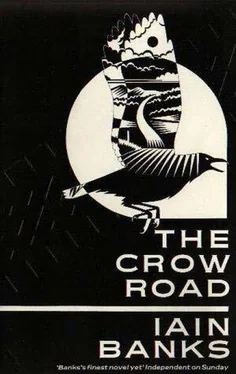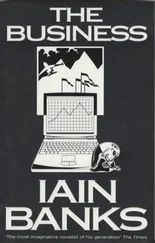Iain Banks - The Crow Road
Здесь есть возможность читать онлайн «Iain Banks - The Crow Road» весь текст электронной книги совершенно бесплатно (целиком полную версию без сокращений). В некоторых случаях можно слушать аудио, скачать через торрент в формате fb2 и присутствует краткое содержание. Год выпуска: 1992, Жанр: Современная проза, на английском языке. Описание произведения, (предисловие) а так же отзывы посетителей доступны на портале библиотеки ЛибКат.
- Название:The Crow Road
- Автор:
- Жанр:
- Год:1992
- ISBN:нет данных
- Рейтинг книги:5 / 5. Голосов: 1
-
Избранное:Добавить в избранное
- Отзывы:
-
Ваша оценка:
- 100
- 1
- 2
- 3
- 4
- 5
The Crow Road: краткое содержание, описание и аннотация
Предлагаем к чтению аннотацию, описание, краткое содержание или предисловие (зависит от того, что написал сам автор книги «The Crow Road»). Если вы не нашли необходимую информацию о книге — напишите в комментариях, мы постараемся отыскать её.
The Crow Road — читать онлайн бесплатно полную книгу (весь текст) целиком
Ниже представлен текст книги, разбитый по страницам. Система сохранения места последней прочитанной страницы, позволяет с удобством читать онлайн бесплатно книгу «The Crow Road», без необходимости каждый раз заново искать на чём Вы остановились. Поставьте закладку, и сможете в любой момент перейти на страницу, на которой закончили чтение.
Интервал:
Закладка:
Lewis looked like he was going to sleep. Either that or the superior intellect of the whisky glass had hypnotised him. I knew the problem.
"Lewis?" I said.
"Wha — what?" he looked at me, confused.
"I was saying," I said. "How are things?"
"Oh," he said, and sighed. "I don't know." He frowned. "Verity said to me just yesterday… she said, 'Lewis, I don't think we understand each other any more.»
"What did you say?" I sipped my whisky carefully.
"I said, 'Whadaya mean?" Lewis snarled.
Then he burst out laughing. It must have been infectious laughter because I started laughing too, and then we were both laughing, but we couldn't have been that drunk because we didn't over-do it. Five minutes later — well, maybe ten, absolute max — we'd stopped laughing almost entirely.
"Really?" I said, wiping my eyes.
Lewis shook his head. "Na, course not. Everything's… was pure dead brilliant, actually."
"Good," I said, and drank. I meant it too, but even as I realised that I meant it, I thought: ah, it's just the drink. I'll be worse in the morning. Still, I looked up at Lewis and said, "I think I'm better."
"Better…?" Lewis began, giggling.
"Better than… yesterday, Mr Creosote?" I started to laugh.
"Better get a bucket — " Lewis howled, but couldn't manage the rest of the line, because by then we were on the floor. I laughed until my ears hurt.
I stood beneath the larches in the rain, holding an umbrella, wearing a kilt and feeling a little self-conscious. The stand of dripping trees had gone yellow and dropped their needles during the last few weeks, turning the ground beneath them a dully shining blond that seemed like a tinted mirror to the ash-bright expanse of overcast sky. I touched the plain black obelisk, slick and cold in the chill October rain. Behind me, the noise from the marquee — an increasing choir of chattering voices — was slowly drowning the patter of the drizzle as it fell through the twigs and branches above onto the sodden ground; a busy, buzzy, shared excitement displacing what the solitary soul perceived as a sort of tranquil gloom.
What guy? I thought. What is Ash going to show me; who? (And already thought I might have guessed.) Shit, I didn't like the sound of this.
The rain came on harder and I listened to it drumming on the taut black skin of the umbrella, remembering remembering.
"Remember the River Game?"
"Remember the Black River Game?"
"Ha!"
We were digging dad's grave, waist deep in the rich black earth of Lochgair, partially shielded from the house by the dense mass of rhodie bushes and tall tangles of wild roses. Jimmy Turrock, the council workman sent from the municipal cemetery to dig the grave officially, and who'd been in the same class as Lewis at school, was sitting against the wheel of his miniature earth-mover, arms folded, head back, mouth open, snoring. That morning over breakfast, Lewis and I had decided we'd dig the hole ourselves. If nothing else, it would take our minds off our hangovers, which were industrial strength.
The River Game was something dad made up himself. He did it for Lewis and me. The first version was roughed out in a big sketch book, while he tinkered with the rules. When he was happy with it all, he got a big bit of white cardboard from a display company in Glasgow, drew out the playing surface, painted it, sprayed it with lacquer and edged the board with black tape. He'd bought various Lego packs and made the ships and the cargoes out of those. The rules were typed, the cards were printed on labels and they were stuck onto the back of ordinary playing cards. We were presented with the result as a sort of extra present to be shared between Lewis and me for Christmas 1981. James was still a bit young; he'd only have chewed the ships and choked on the cargoes.
Lewis — who had asked for and got a television for his room, and a new Walkman — had the good grace to express gratitude. I was still celebrating having finally worn down dad's resistance to having a computer in the house, and was therefore far too busy kicking pixel and re-staging the attack of the Imperial AT-ATs on the rebel snow trenches to be bothered sparing more than the most cursory glance at what was, when all was said and done, a lump of amateurishly painted cardboard, a handful of non-motorised and very basic Lego bits, a few adulterated cards and what looked suspiciously like an exam paper. "Yeah; great, dad. Got any more PP9 batteries for this wee car? The one out your calculator didn't last long," was about as enthusiastic as I got about the game for most of the festive period.
Later, I deigned to play.
The River Game was based on trade; dad had wanted something that would distract us from all the war games Lewis and I played: soldiers, with our friends in the woods, battles with our toys, wars on friends" computers. He really wanted something non-capitalistic as well as non-military, but the River Game was going to be just his first effort; he would — he told us — be working on something much more right-on, once he had the time to spare. He'd see if we liked the River Game first.
You had two or three ships; you sailed them from a port on one side of the board to a port on the other side through what was either a big loch or lake choked with islands, or a piece of territory with an awful lot of waterways snaking through it, depending how you chose to look at it. You picked up cargo at the second port and sailed back. The cargo was worth a certain amount when you got back to your home port, and with the money you could buy more ships, configured for speed or capacity. There were at least half a dozen major routes from one port to the other, and basically, the shorter the route you took, the more hazardous it was; there were whirlpools, channels prone to rock falls, stretches of river where the sand-banks changed all the time, and so on. The weather had a chance to change every few moves, and how much the different types of cargo were worth depended on… Oh, what your opponents had chosen to carry, what the weather was, whether the month had an «r» in it; I can't remember it all.
It was quite a fun game, mildly addictive, with a reasonable balance of skill and luck, and Lewis and I eventually got quite a few of our friends playing it, but the truth is it improved dramatically when Lewis — with my help — drew up an extra set of rules which let you build warships!
We played that game for weeks before dad caught us at it in the conservatory, one rainy May day, and asked how come there were all these ships with funny-coloured cargoes clustered so close together and surrounded by wrecks where there were no hazards.
Oops.
We called it the Black River Game (Dad even objected to the title). He had been working on a new improved version of the original game that involved using some of the money to build railways across the board; you laid track, you built bridges, dug tunnels, coped with rock falls and marshes and recalcitrant land owners, and the first one to finish his or her railway was, in effect, the winner. But he stopped work on this sophistication when he found us acting out furiously destructive naval engagements on his painstakingly crafted board. He didn't take it away, though. I think for a while he was trying to develop another non-combative game that he'd defy us to turn martial, but it stayed at the development stage and never did see the light of day.
I stopped digging for a moment, wiped some sweat from my brow with the hem of my T-shirt, which was lying on the ground at the head of the grave. I leant on my shovel, looking at Jimmy Turrock's up-ended face while he snored. Lewis stopped digging for a moment too, breathing hard.
I said, "We disappointed him, though, didn't we?" Lewis shrugged. He took a handkerchief from his back pocket and wiped his face. "Oh, Prentice, come on; boys will be boys. Dad knew that."
Читать дальшеИнтервал:
Закладка:
Похожие книги на «The Crow Road»
Представляем Вашему вниманию похожие книги на «The Crow Road» списком для выбора. Мы отобрали схожую по названию и смыслу литературу в надежде предоставить читателям больше вариантов отыскать новые, интересные, ещё непрочитанные произведения.
Обсуждение, отзывы о книге «The Crow Road» и просто собственные мнения читателей. Оставьте ваши комментарии, напишите, что Вы думаете о произведении, его смысле или главных героях. Укажите что конкретно понравилось, а что нет, и почему Вы так считаете.












